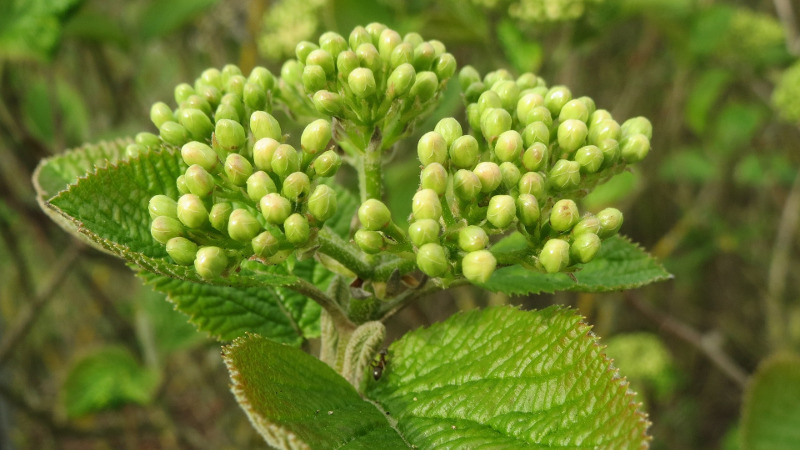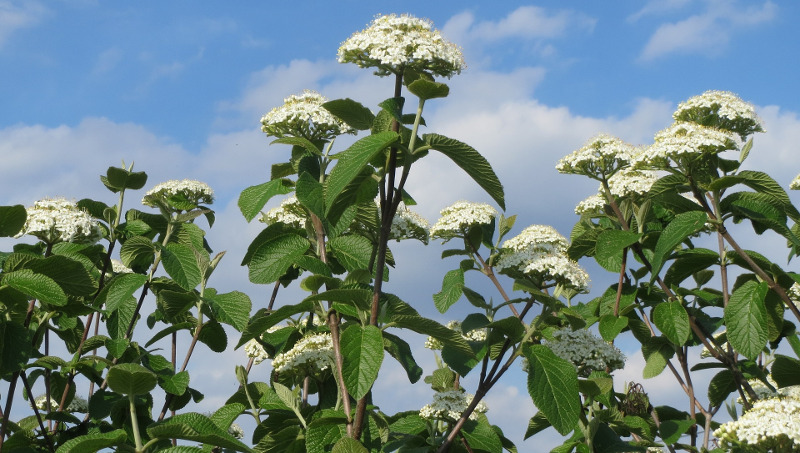Viburnum consists of over 150 different species of plant. Hardy in zones 2 to 9, it is easy to find one that will thrive in your garden. These shrubs can grow well in average garden soil, but prefer slightly alkaline soil (7.0). Viburnums are hardy growers and do not require a lot of fertilizer. Unless your soil has a deficiency, you may not need any fertilizer at all. A simple soil test can determine the quality of your soil.
It is important to apply the correct fertilizer which will help promote healthy foliage and flowering. Less is more when it comes to fertilizing viburnum. Too much nitrogen in the soil will make your shrub put out a lot of foliage growth and very few blooms.

How to Fertilize Viburnum
Most varieties of viburnum grow best in moderately acid to slightly alkaline soil between 5.5 and 8.0. The soil pH preference should be listed on the label of the plant species that you purchase. Before planting or fertilizing, you may want to test your soil to figure out what nutrients are lacking and what nutrients there may be too much of. You can purchase a home soil test kit or hire a professional to complete the test.
The root system of viburnum can grow 18 inches deep or more, but the feeder roots responsible for absorbing water and nutrients are in the top 12 inches of soil. Spreading fertilizer on the surface of the soil will reach the feeder roots. Starting a foot from the trunk of the shrub, spread the fertilizer evenly around each shrub to just outside of the branches. Water thoroughly so the fertilizer sinks into the soil.
Best Time To Fertilize Viburnum
Viburnums are not heavy feeders, but can benefit from a once a year fertilization in the spring. When well established, it can do fine without any feeding. If you would like to boost blooming and foliage color, you can feed the viburnum a slow release tree and shrub formula just after it blooms. This can be done up to two months prior to the first expected frost date. To support root growth, a compost mulch (with fish meal) can be applied in the fall after the first frost but before the ground freezes.
Best Fertilizer For Viburnum
Due to its hardiness, viburnums can do without fertilizing unless there is a deficiency in the soil it is planted in. A simple soil test can determine what nutrients are lacking in your soil. Viburnums like well drained acidic soil. Too much nitrogen in the soil can result in a lot of vegetative growth and very few blooms. An annual application of a balanced commercial fertilizer will make your viburnum happy, but be careful of adding too much nitrogen.
If you prefer to use organic fertilizer, you can easily taylor it to the specific needs of the soil. Mulch containing manure, fish fertilizers, compost, or alfalfa pellets will improve the soil as well as feed the shrub. Adding bone meal to the soil at planting time can help the roots and new growth. When new leaves emerge in the spring, you can apply Miracle-Gro Shake ‘n Feed Flowering Trees & Shrubs Plant Food and water well into the soil.

Viburnum Fertilizing Tips
- Viburnum will grow well without a lot of fertilizer
- A well-balanced slow release fertilizer works well
- Moderately acid to slightly alkaline soil between 5.5 and 8 is ideal
- Complete a soil test to determine soil quality
- Too much nitrogen results in less blooms
Warnings
-Always wear protective gloves and a face mask when handling chemical fertilizers.
-Closely follow all directions and storage guidelines that are on the fertilizer label.
 |
Author Chris Link - Published 02-12-2021 |


